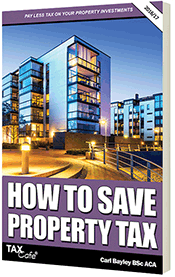Top 10 Tax Deductions for Property Investors
By Carl Bayley BSc ACA
A few months ago we published an article on the Top 10 Tax Deductions for Small Businesses. This month, by popular demand, we take a look at the Top 10 deductions property investors can claim.
1. Interest
Whether your interest is tax deductible or not depends on the use to which your money is put. Contrary to popular belief, it does not matter on which property the loan is secured.
If Robert borrows £25,000 by re-mortgaging his home and uses the money as a deposit on a buy-to-let flat he can claim the interest because it is being used for business purposes.
And here's an interesting tax tip. If you intend to put your former home into your property letting business, consider re-mortgaging it before you do. All the interest will probably be tax deductible.
For example, let's say Robert's brother Vincent has a property worth £500,000 and an outstanding mortgage of £200,000. He remortgages the property and raises £250,000 which he uses to buy a new home.
He now starts to rent out his £500,000 property. The entire interest payable on the whole of Vincent's £450,000 mortgage will be allowable as a tax deduction.
2. Repairs & Maintenance
You could write pages about this so here's a quickie: Did you know that you can make provision for certain future costs, that you have not yet actually incurred, and still claim a tax deduction? The key requirement is that you are legally obliged to incur the expenditure.
Let's say Kylie owns three flats in Hutchence Towers. In February 2006 she receives a statutory notice telling her and other owners to carry out roof repairs. On 4th April 2006 a quotation from a local builder is approved and Kylie's share of the cost is £3,000.
Kylie can make a provision for her £3,000 share of the cost in her accounts for the year ended 5th April 2006, even though the work has not even started yet.
3. Motor Expenses
The cost of running one or more cars used in your property business can be claimed as a business expense. Generally, the vehicle will have some private non-business use, so an appropriate proportion should be claimed.
The appropriate proportion will vary from investor to investor but could be in the range 25% to 50%.
4. Office Costs
Most investors do their admin at home and can therefore claim a proportion of their household bills. Generally the proportion used is based on the number of rooms, excluding bathrooms and kitchens.
Let's say Gerald runs his property business from a small room in his house. The house also contains a living room, a kitchen, a bathroom and two bedrooms. Gerald's house therefore has four rooms which count for this calculation.
He can therefore claim one quarter of his bills as a business expense. Expenses which can be claimed include gas and electricity, council tax, repairs to the property and insurance.
5. Travel & Subsistence
Travel costs incurred visiting your existing properties or scouting for new ones should be claimable. If your trip requires an overnight stay you will also be able to claim hotel costs and meals in restaurants.
However, these costs will only be allowable if your trip is purely for business purposes. If you travel to Brighton to view some properties, the fact that you spend a spare hour sunbathing does not alter the fact that this was a business trip.
If you take the whole family to Brighton for a week and spend just one afternoon viewing properties, the whole trip will be private and not allowable for tax purposes.
6. Training & Research
Many investors spend a lot of money on seminars, courses, books and magazines. The rule is that expenses incurred in updating or expanding existing areas of knowledge may be claimed but any costs relating to entirely new areas of knowledge are a personal capital expense.
This can be a difficult distinction to draw, however in most cases property research expenses should be tax deductible.
7. Furnished Lettings
Most landlords rent out their properties fully furnished. You can claim either the 'wear and tear allowance' or 'renewal and replacement expenditure'. There isn't enough space here to go into details, however most people are better off with the wear and tear allowance. This generally allows you to claim 10% of your rents as a tax deduction.
8. Legal & Professional Fees
Fees incurred buying a property cannot be claimed against your income tax - they are generally only allowed as a capital gains tax deduction when you eventually sell your property. Costs incurred year in, year out in earning rental profits can be claimed, for example the cost of preparing leases, collecting debts and preparing your tax return.
9. Pre-Trading Expenditure
You may incur some expenses before you even start to rent out any properties. Those incurred within seven years before the commencement of your business may still be allowable if they would normally be tax deductible. In such cases, the expenses may be claimed as if they were incurred on the first day of the business.
10. Rental Losses
All your UK property lettings are treated as a single UK property business. Hence, the loss on any one property is automatically set off against profits on others. Any overall loss cannot generally be set off against your other income but will be carried forward and set off against future rental profits. Losses arising on furnished holiday lettings may, however, be set off against other income and can sometimes lead to useful tax repayments.






